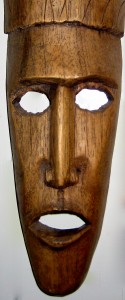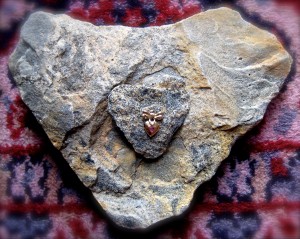Sorry, forgot to mention that once again we have changed things up and you are offered Chuck’s blog today. Jan’s blog will appear on Friday this week. Enjoy!
Monthly Archives: January 2013
Chuck’s Place: Being Of Two Minds

Ever since we left the Garden, we’ve had to rely on stories—be they myth or fairy tale—to provide us with a description of reality to orient us on how to be and behave. Prior to the Fall, as unthinking beings, we had the surety of our animal instincts to guide us with direct knowledge of the way things were and how to act appropriately. After the Fall we became beings of 2 minds, split into the mind that knows without thinking and the mind that thinks incessantly, generating newer and newer myths and stories—descriptions of reality to live and act by. The dominating myths of our times are created by Science, with its descriptions of reality that are believed to be objective and true.
The Shamans of Ancient Mexico went so far as to call the thinking mind a foreign installation, an actual entity that has taken up residence inside us for its own nourishment. Like all descriptions of reality, this description too is a story, the foreign installation a metaphor highlighting the impersonal nature of our chattering minds. That foreign installation has generated its picture of the world based on stories inherited and constantly generated by the internal dialogue within us.
We are a species addicted to our stories. We constantly crave stories—in books, movies, or oral traditions—to provide us with a sense of security, an identity, a framework, a world within which to grasp and live the totality of what we are. In turn, we are constantly catered to by a worldwide web of stories—news that frames and organizes our world—our dissociated instinctual selves finding outlets in the latest tales on the world stage or the latest thriller in the theatre. The spin doctors weave their tales, like salespeople catering to our need for a story to bring us peace and order, or an outlet for frustration, boredom, and depression.
In the healing field of psychology, clients are encouraged to build new narratives to find meaning in their lives. Unprocessed experience, like trauma, is fit into a narrative to make it more palatable, digestible, as if a new story can put the raw truth to rest. However, not all experience fits neatly into a story.
The fact is, our species is in peril because our stories simply aren’t true anymore. In fact, I believe we are at an evolutionary crossroads that demands that we step beyond the story and into full exposure and reconciliation with what is—without story, without metaphor. Look to the recent exposure of sexual abuse cases of children, and how we care not to know the full details. Instead, we hope they are not true; we hope that a different story will emerge. But healing will only come when we learn to accept what is.
President Obama steps into his second term largely freed of the need to uphold stories, dated myths of who we are and where we are. He can now point to the truth of global warming, the legitimacy of social programs, the real needs of woman and gay people, and the true inequality of our financial system. We need to be a world that can stand in and be with the truth now. We need to allow ourselves to reconnect with our ancient minds, the mind that speaks softly and dispassionately, with dead-on accuracy. This is the mind that can be in the presence of the full truth, that can guide us to healing, without story. In the groundlessness of direct experience, as we face our old stories and myths, the knowing that emerges is not just another story, but a documentary of the truth. In the groundlessness of no story we grasp the real truth and allow it to be fully experienced, fully known, and then finally filed away in the annals of life lived, tension fully released and resolved.

We have the opportunity to resolve our wounded psyches and bodies in the same groundless, storyless manner. In the case of trauma, we must allow ourselves to encounter what was, as it was, without framework, without the story we’ve always told ourselves. Our present self must be able to stand in the full presence of the traumatic event and breathe through it, without shutting down, allowing the full experience to be admitted, our personal docudrama acceptable for what it truly is. Our knowing mind leads us to full healing as the old myths fall away, no longer needed to hold us together. In the presence of this knowing mind, the adult present self merges in love with all its formerly splintered truths. We evolve into beings no longer needing two minds. We emerge as journeyers of one true mind, fully equipped for the adventure, without the weight of story.
Is that not Buddha beneath the bodhi tree at the moment of enlightenment—a being with full awareness without story—launched? Is that not the Shaman on the precipice of the definitive journey into infinity—a fully recapitulated being without attachment to story, a being with continuity and full awareness, perched for flight? Is that not like President Obama turning back to look out over the crowds at his inauguration, taking in the truth of a sight he will never experience again? Standing in his own truth, while others stream past him as if he were not even there, he releases that story and, having completed his backward glance of recapitulation, turns to face the future.
We all have the opportunity to face the truths of our two minds, to release our stories and stand in the truth of what is. Traumatized or not, it’s time to heal in a new way.
Recapitulating without story,
Chuck
A Day in a Life: Healing The Wounds Of Childhood Sexual Abuse

It has taken me several days to figure out the value of writing this essay when I have already written so much about the subject of childhood sexual abuse, already published one book about my encounters with a sexual predator, and am in the final stages of completing the second book in the series entitled The Recapitulation Diaries. I let my dreaming self become part of the decision. In the middle of the night I woke up and finally knew I had to write this blog because something that Barry Lopez and Terry Gross decided and stated at the beginning of an interview on Fresh Air would not leave me.
Here is what Terry Gross says at the beginning of the interview: “We agree, you and I, that there is no need to drag you, in this interview, through a traumatic retelling of the details of what happened to you…“
Barry Lopez is an American writer who published an essay in the January edition of Harper’s magazine about the sexual abuse he suffered as a child. In that article he is forthcoming about what happened to him, giving descriptive details, and I commend him for his honesty and bravery in sharing his story. Between that publication and the Fresh Air interview, both of which are worthy reading and listening to on the subject of childhood sexual abuse—I link to both of them at the end of this article—something seems to have happened to Mr. Lopez.
Considering the position he’s in, invited to speak publicly and then to not tell the details, leaves a bad taste in my mouth, as if there’s still something wrong with speaking frankly and openly about sexual abuse, something bad about it, a distasteful stigma attached to being sexually abused, even after all that’s recently been exposed. It’s just something not talked about in polite society. Those were my first thoughts upon hearing Terry Gross make the above statement, but as I listened to what she was really saying, “no need to drag you…through a traumatic retelling of the details,” I understood that Mr. Lopez has not healed from the wounds of his childhood sexual abuse, for if he had the retelling of the details would no longer haunt him. And as the interview proceeds it becomes clear that this is so, in spite of the deep work he has done.
I read the article, ‘Sliver of Sky,’ in Harper’s first, and to his credit Mr. Lopez does a magnificent job of telling his story, replete with details, but even there something bothered me. It was only in listening to Mr. Lopez speak with Terry Gross that I finally understood what it was, for the radio interview more clearly reveals the difficulties Mr. Lopez still faces. I felt the same thing after reading Marilyn Van Derbur’s book, Miss America By Day, who wrote so bravely of being sexually abused by her father and in which she states that she could only go so far in healing. People are not finding the means to heal from the deep wounds of childhood sexual abuse.
Mr. Lopez is compassionate, articulate, and completely honest about the many aspects of living with PTSD, though he states near the end of the Fresh Air interview that he has a sense of “falling backward into places he has not been for years, terrified.” He states that “It never leaves you.” I beg to differ, and so I must write this essay today, in hopes of sharing, once again, insights that I’ve learned during my own process of healing, really healing from the sixteen years of childhood sexual abuse that I suffered and that dogged me long into adulthood.
Mr. Lopez seems to question, as he confronts the aftermath of the article in Harper’s, whether or not it was right for him to have gone public. He has been receiving letters and calls for aid, it seems, and although he is clearly a good spokesman for the truth of sexual abuse, he states that he holds no credentials. He questions, it seems, whether or not he was really ready to face the whirlwind he finds himself in now, as a public figure speaking on such a sensitive subject. He also questions what comes next, for facing sexual abuse and what to do about it is a common dilemma that we all must face. I say, keep talking, Mr. Lopez; keep facing the abusers, keep writing and speaking the details so others, those not sexually abused especially, really understand what it means to be a child in a compromised position, unable to find a way out.
I feel deep compassion for Barry Lopez. I am also grateful to him for keeping the dialogue fresh, for daring to carry a torch he never sought. It’s important. It’s helpful to so many, to those in the process but also to those who have not yet confronted their own issues of sexual abuse. At the same time, I must protest some of his conclusions, though I realize they are made in the context of where he is in his own healing process and so I apologize if I seem judgmental, I do not mean to be, but I cannot accept that “It never leaves you.” In making that statement, a door of possibility slams shut. I say, don’t close any doors, leave them all open, look into them and find the means of healing, because with the right process there is healing from even the deepest of trauma, and at the risk of sounding pompous, I must also say that I have experienced it. I am healed. There is a way to heal.
At one time I too was terrified, in constant heightened alert, traumatically impacted for far longer than the actual years of abuse. It was only through the work I did, by taking a journey of recapitulation that I was able to fully heal. The word recapitulation comes from a shamanic practice used by the Shamans of Ancient Mexico, but through the work I did with Chuck Ketchel, my husband, we discovered its value as a healing treatment for PTSD. And we have, for the past ten years, been slowly introducing it to others.

That process of recapitulation involved reliving the years of abuse in detail—investigating them from many different perspectives, speaking of them over and over again in a supportive environment, facing the disintegration of their hold on me by allowing myself to totally change how I viewed the world and my place in it—and in so doing I was able to emerge from the process of recapitulation fully healed. By healing, I mean that I am no longer attached to the trauma that once dragged me into terror. I no longer have deeply entrenched feelings of low self-worth. I no longer walk in fear. I no longer hide out. The past no longer has a hold over me. I can go back to any memory, in full detail, and have no emotional reaction. I can write about it, talk about it, without any dissociation, trauma, or shame—it’s simply a fact of my past.
I chose to write about the recapitulation journey I took. I knew it was important, that it offered something to others. In the introduction of my first book, The Man in the Woods, I state the reasons for writing the details of what happened to me. It was important at the time for me to be explicit, and it still is, for I know that people do not really understand what happens when a child is sexually abused. It’s too hard to imagine that anyone would or could rape and sodomize a child, even an infant, but guess what, it happens. It happens far more often than any of us like to imagine. If one in three girls and one in seven boys are being sexually abused, the statistics that Mr. Lopez cites in his Harper’s article, that’s an awful lot of sexual abuse going on that no one is catching.
The sexual abuse discussion has to be brought out of the darkness and into the light. People need to know that it’s possible to heal. To his credit, in the Harper’s article, Mr. Lopez describes his lengthy therapeutic process, realizing that he could only confront what happened to him when he was ready, and this must be taken into consideration. We will know when we are ready when something just won’t let us rest until we attend to it. In my own case, it was my dying spirit that finally alerted me to the truth that if I didn’t attend to it, I might really die.
In our blogs, in my books, and in the psychotherapy work Chuck does addressing PTSD and sexual abuse, we seek to offer some new methods of healing from even the most traumatic of events. And so I write this blog today, in hopes of changing some minds about that idea that one cannot heal, that just because you have been sexually abused you will remain terrified for the rest of your life. It just isn’t so.
Seek help. Don’t be afraid to speak or write to someone you feel safe with. Keep the dialogue going. In the right circles it will be perfectly acceptable to do so. As circles go, they have a tendency to widen, and so if we keep writing, talking, sharing, and helping each other to face our fears we may pretty soon erase the stigmas that keep us from our deeper truths and get down to addressing the real issues of our society and why we have gone so deviant. There is something wrong at the core of humanity, and it does not lie in the sexually abused, but in humanity’s aberrant relationship to the sexual instinct. And if we can’t talk about it in real descriptive terms, how are we ever going to heal? But that’s another blog.
To her credit, Terry Gross is sensitive to the fact that a discussion of details could trigger a traumatic reaction and nobody should have something like that imposed on them. However, the idea that a trauma is forever lurking creates a framework where the legacy of the abuser continues, for a lifetime, to hold a victim in check. And if this is accepted as the best one can do then full healing has not happened. Full healing means the ability to stare the full intimate details of traumatic experience in the face without discomfort and to be able to discuss those details without discomfort too.
Thanks to Barry Lopez and Terry Gross for getting a new dialogue going. Wishing you all good healing options and love to carry you forward,
Jan
Here are the links: Fresh Air and Sliver of Sky. I notice that the Harper’s article is only available to subscribers in its fullness. I’ll see if I can find a link to the full article elsewhere, or if you happen to see the magazine buy it. It’s worth the read.
Chuck’s Place: PTSD—The Doorway To Expanded Reality

Ordinary reality is our world of solid objects constructed by the building blocks of time and space as organized by the mind through its faculty of reason. Ordinary reality is a discreet world that increasingly sees itself as the only world, the one true reality. This is an old world view not dissimilar to the view once held that the earth was the center of the universe, that even the sun had to revolve around it. We now know that this egocentric, earth-centric view of the universe is false. The truth is that Earth is actually a minor player in a vast, endless universe.
Many people today also know that ordinary reality is but a subset of a far greater reality, that of infinity and the many worlds that coexist within it. Just as in Galileo’s time, today we encounter the fierce guardians who protect and uphold the notion of the one and only true world of ordinary reality. These guardians fear the collapse of the world as we know it—if the doors were to open to the experience of life beyond ordinary reality.
These same types of guardians operate within the psyches of all of us. There are veils that protect our version of who we are, what’s happened to us, and what really exists in this world. In trauma we are jolted beyond the confines of ordinary reality into a state of heightened awareness. In the world of heightened awareness, time and space as we experience it in ordinary reality are suspended. Many people report that time slows considerably during a trauma, that very slow motion and a sense of clarity to each unfolding detail are experienced.

The laws of space and reason are suspended as well in the heightened awareness of trauma. People report being partially out of or completely separate from their physical bodies, witnessing the entire traumatic event from a great distance, often with a remarkable sense of detachment.
Once a trauma has completed, consciousness immediately shifts back into ordinary reality. Similar to emerging from a dream world state back into waking reality, the experience of trauma disappears like a quickly evaporating dream. The guardians of the psyche of ordinary reality return and go to work to fit the residue of the experience that won’t disappear into some reasonable story that fits the guidelines of ordinary reality, once again ensuring the sanctity and supremacy of ordinary reality—known as sanity.
Jan relates that in her experiences as a sexually abused child, as soon as she left her abuser’s world—walked back out through the veils and into ordinary reality—she left the traumatic event behind, but there were still physical and emotional residues to deal with. As a six year old, pain in the pelvic region or crotch was given a reasonable explanation, coming from too much bike riding, or later as a teenager from horseback riding. Sometimes, even before crossing back into ordinary reality, the pain had already settled in some other area of the body, such as in the arm or neck, also related to the trauma but much easier to bear, more acceptable than a pain in a most private part of the body that no one ever spoke about or was supposed to touch. Emotional pain turned to acting out and anger, as she blamed others for the turmoil inside that she could not fully encapsulate.
Ordinary reality does not permit a world where time and space are suspended and reason falters. So the guardians of ordinary reality employ forgetting, doubting, and revisionism to secure the borders from the irrational intruders of experiences of trauma, that is, heightened awareness and non-ordinary reality.

PTSD is the result of the collision between that world of ordinary reality and non-ordinary reality. In PTSD the psyche is forced into a state of hypervigilance as it attempts to keep at bay the intrusions of the experiences of non-ordinary reality into its perfectly reasonable state of ordinary reality. Society-at-large fears and denies PTSD because of the threat it poses to the supremacy of ordinary reality over all reality. Certain experiences just don’t fit into the perfectly reasonable world that the guardians uphold: “How could someone forget something like that?” “Repression doesn’t exist!” “It’s impossible to have sex with an infant!”
The current incidences of mass trauma played out on our world stage are rapidly pulling down the veils that the guardians of reason uphold, revealing the existence of powerful worlds beyond that of ordinary reality. In recapitulation we voluntarily undertake exploratory journeys into our personal experiences in non-ordianry reality: traumatic or otherwise. The challenge for all recapitulations of traumatic states of heightened awareness is allowing the truths experienced in those states of non-ordinary reality to be permitted into the knowing of ordinary reality, to accept the validity of other worlds within the self. It’s both a humbling and a terrifying process.
Doubt so often appears to undermine the knowing of the truths so overwhelmingly presented during recapitulation. Frequently the body replays, in excruciating sensory detail, the experience that occurred in the heightened awareness state of trauma. The nightmare of this trauma is relived in all its intensity to prove to the consciousness of ordinary reality that indeed it happened! Amazingly, doubt can disavow even such powerful experiences for a long time. Ultimately, however, as a supportive process of recapitulation unfolds, ordinary reality expands to include the truths stored in the timeless world of non-ordinary reality.
Eventually these two worlds merge into greater wholeness and we become beings less attached to a narrow view of the universe. Like Galileo, we become proponents of and explorers of a new universe, beings far better equipped to navigate and discover the deeper dimensions of infinity, the infinity of ourselves.
In many worlds,
Chuck

